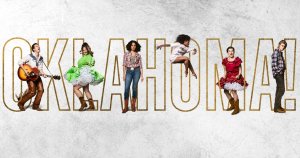It won a Tony on Broadway, and Evening Standard awards – for Fish and his then-co-director Jordan Fein, and for Patrick Vaill’s searing performance as Jud Fry – at the Young Vic last year. In New York they called it “sexy Oklahoma!”. A horrible phrase, but undeniably apt.
It’s 1906 and there’s hope in the air as this territory prepares to join the nascent United States and shift from cattle to agriculture. But there’s not much to life apart from farming, fighting, and, well, that other word beginning with ‘F’. The “box social” dance, where cowboys and ploughmen bid on lunches prepared by the women – and by extension, on the women themselves – is a big deal.
Arthur Darvill’s cocksure Curly and Anoushka Lucas’s smouldering Laurey embark on an antagonistic, erotically charged courtship ritual, in which the hapless incel Jud is collateral. Meanwhile, Georgina Onuorah as the heedlessly libidinous Ado Annie ignites fires in the loins of simple-minded Will Parker (James Patrick Davis) and Persian peddler Ali Hakim (Stavros Demetraki). Liza Sadovy as matriarch Aunt Eller has a wry, flirtatious manner, too.
Onourah is the most prominent newcomer in a cast that includes actors from the runs at the Young Vic, in New York, and – in Vaill’s case – from the show’s first iteration as a student production at Bard College 15 years ago. The sweetness of Onourah’s Ado Annie stands in pleasing contrast to Lucas’s extraordinary, curbed sensuality. Likewise Vaill’s palpable anguish as Jud offsets the swagger of Darvill’s guitar-toting Curly.
It’s staged under bright lights on a set of bare wood lined with guns, designed by Lael Jellinek and Grace Laubacher. The cast confront us wearing 1970s style western garb and insolent expressions. This draws us effectively into their world: until, that is, the women are compelled to don horrible, leg-flashing tutu-style crinolines for the dance, which strikes a jarring note.
Curly and Jud’s attempts to woo Laurey are staged in complete darkness and the standoff between the two men in intimately filmed close-up. The atmosphere between the three is charged: it can go any which way, you feel. The post-interval ballet routine, expressing Laurey’s choice about her future, is sinuously reimagined for a lithe dancer (Marie-Astrid Mence) in a shimmery T-shirt and little else.
Daniel Kluger orchestrates the score for banjo and pick guitar as well as swooping strings. The big numbers – Oh, What a Beautiful Mornin’; People Will Say We’re in Love; the title song – are unleashed full throttle though the superb band often drops out to let Lucas, Vaill, Onourah and Darvill sing unaccompanied, and beautifully.
It’s not perfect: allusions to America’s gun problem feel strange in a work that whitewashes frontier history. Losing the intimacy of the Young Vic’s in-the-round staging is also felt. But this remains a rip-snorting, chap-slapping, foot-stamping triumph.

